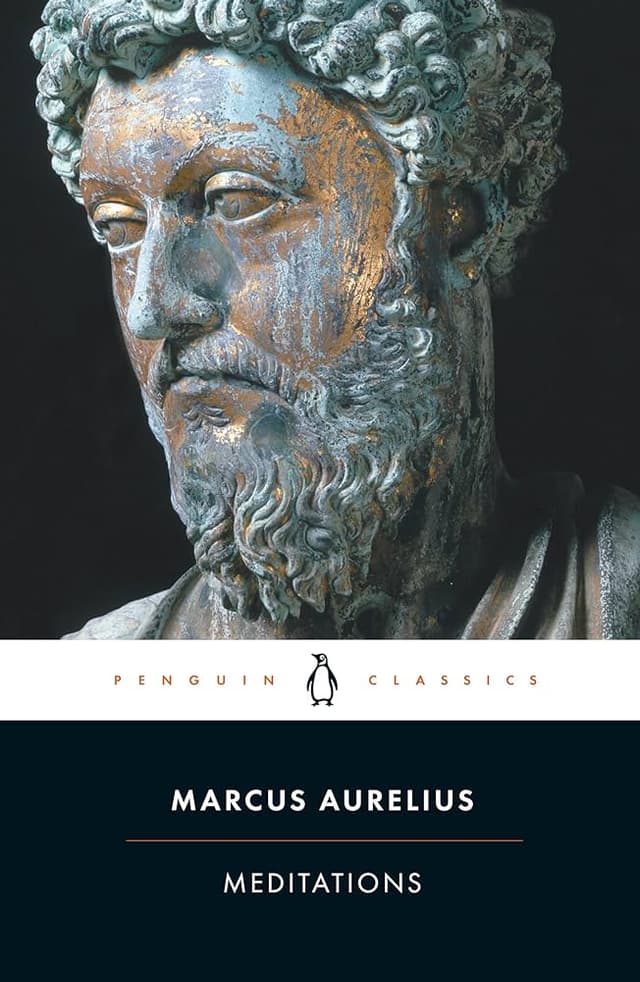Sapiens: A Brief History of Humankind by Yuval Noah Harari vs. Meditations by Marcus Aurelius
Sapiens: A Brief History of Humankind by Yuval Noah Harari
The great thing about this book is that it takes a big-picture view of human history. It attempts to explain the main themes of human history without getting bogged down in the details. Sapiens also debunks many popular myths about human history, including the one that people today live happier lives and have better diets than our hunter-gatherer predecessors. It comes with an epilogue about the future of humankind in light of ever-accelerating technological progress. With the recent advances in AI it is more relevant than ever. If you're going to read one book on history this year, read this one.
Meditations by Marcus Aurelius
From wikipedia: Meditations is a series of personal writings by Marcus Aurelius, Roman Emperor from AD 161 to 180, recording his private notes to himself and ideas on Stoic philosophy. Meditations are worth reading if only to get a glimpse at the thoughts of a man who lived a life in truly extraordinary circumstances of being a Roman Emperor. It's surprising how relevant the themes of his diaries are two thousand years later.


Reviews
Reviews
| Item | Votes | Upvote |
|---|---|---|
| No pros yet, would you like to add one? | ||
| Item | Votes | Upvote |
|---|---|---|
| No cons yet, would you like to add one? | ||
| Item | Votes | Upvote |
|---|---|---|
| Practical advice on personal conduct | 1 | |
| Historical insight into Roman times | 1 | |
| Written by a Roman Emperor | 1 |
| Item | Votes | Upvote |
|---|---|---|
| No cons yet, would you like to add one? | ||
Frequently Asked Questions
'Sapiens: A Brief History of Humankind' by Yuval Noah Harari provides a comprehensive overview of human history, debunking popular myths and exploring the future of humanity in light of technological progress. On the other hand, 'Meditations' by Marcus Aurelius offers personal insights and Stoic philosophy from a Roman Emperor, which are surprisingly relevant even today. If you are interested in a big-picture view of human history and future, 'Sapiens' might be more appealing. However, if you are drawn to personal reflections and timeless wisdom, 'Meditations' could be the better choice.
'Sapiens: A Brief History of Humankind' by Yuval Noah Harari delves into the broad themes of human history, covering various aspects from the evolution of Homo sapiens to the impact of technology on our future. 'Meditations' by Marcus Aurelius, while offering historical insights, focuses more on personal thoughts and Stoic philosophy from the perspective of a Roman Emperor. For a more comprehensive historical understanding, 'Sapiens' would be the better choice.
'Sapiens: A Brief History of Humankind' by Yuval Noah Harari includes an epilogue that discusses the future of humankind in the context of accelerating technological progress and recent advances in AI, making it highly relevant to modern technological advancements. 'Meditations' by Marcus Aurelius, while timeless in its philosophical insights, does not specifically address modern technology. Therefore, 'Sapiens' is more relevant to contemporary technological issues.
'Sapiens: A Brief History of Humankind' by Yuval Noah Harari takes a big-picture view of human history. It explains the main themes of human evolution and development without getting bogged down in details. The book also debunks many popular myths about human history, such as the idea that people today live happier lives or have better diets than our hunter-gatherer predecessors. It ends with an epilogue discussing the future of humankind in light of accelerating technological progress, making it particularly relevant given recent advances in AI.
'Sapiens: A Brief History of Humankind' discusses several main themes, including the cognitive revolution, the agricultural revolution, the unification of humankind, and the scientific revolution. The book explores how these events have shaped human societies, cultures, and economies. It also delves into the impact of technological advancements on the future of humanity.
Yuval Noah Harari is an Israeli historian and professor in the Department of History at the Hebrew University of Jerusalem. He is known for his bestselling books 'Sapiens: A Brief History of Humankind', 'Homo Deus: A Brief History of Tomorrow', and '21 Lessons for the 21st Century'. Harari's work focuses on broad historical processes and their implications for the future.
Pros of 'Sapiens: A Brief History of Humankind' include its broad, comprehensive view of human history and its ability to debunk popular myths. The book is also praised for its engaging writing style and thought-provoking insights. Cons might include its broad scope, which can sometimes lead to oversimplification of complex historical events, and the fact that some readers may find its speculative future predictions less convincing.
'Meditations' is a series of personal writings by Marcus Aurelius, the Roman Emperor from AD 161 to 180. It consists of his private notes to himself and his ideas on Stoic philosophy. The book offers practical advice on personal conduct and provides historical insight into Roman times.
Pros of 'Meditations by Marcus Aurelius' include practical advice on personal conduct, historical insight into Roman times, and the unique perspective of being written by a Roman Emperor. There are currently no listed cons for the book.
'Meditations' was written by Marcus Aurelius, who was the Roman Emperor from AD 161 to 180.



















